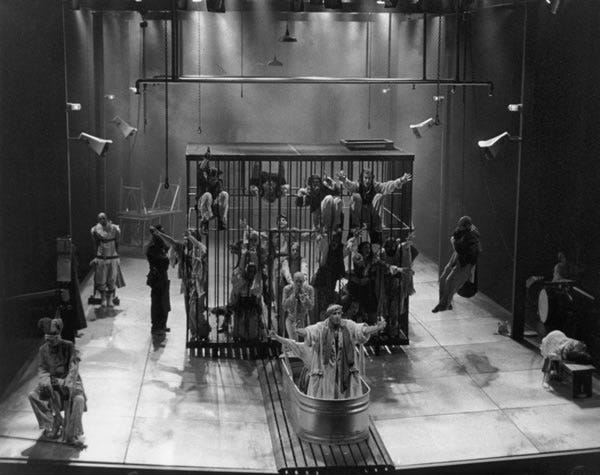Thus Always Unto Tyrants Reading List Part Two
reading the work of dead authors is the nearest thing to communicating with the dead
Manhunt: The 12 Day Chase For Lincoln’s Killer- James L. Swanson A popular history book written written as a thriller. I’ve taken a couple of things from this book for staging Booth’s death. There are a couple of pages about Lincoln and Booth’s parallel love of Shakespeare, particularly Macbeth. Apple TV made a show from this book a couple of years ago. It was entertaining but couldn’t shake that Apple TV sheen. I’m not really trying to make historical fiction, not really. I’m still struggling to find the balance of narrative and expressionism. I think that can really only be figured out in the next stage of the project, once staging and lighting get involved. As long as I keep writing it at my desk my impulse is to be writing it like a story.
Against Interpretation- Susan Sontag- I returned to this collection for two essays: “The Death of Tragedy” and “Marat/Sade/Artaud”.
“The Death of Tragedy” spends much of its time in dialogue with “Metatheatre: A New View of Dramatic Form” by Lionel Abel over the difference between the metaplay and tragedy, the former being defined by the self-consciousness of its protagonists as much as other any other formal devices ( “a theater whose leading metaphor is the world is a stage”, though Macbeth is one of the rare modern plays she admits as a tragedy1. Hamlet is the “towering figure of Western metatheater, and Edwin Booth the definitive Hamlet of 19th century America, but it was John Wilkes Booth who performed the truly meta-theatrical event. The stage is only taken after the action occurs. (Caesar was killed in a theater named for his defeated enemy.)
“Marat/ Sade/ Artaud”- theatricality and insanity, that theatricality and insanity allowing for a new kind of play of ideas, language used as a form of incantation. “That the ideas are taken up in Marat/ Sade are not resolved, in an intellectual sense, is far less important than the extent to which the do work together in the sensory arena.”2 “Marat/Sade”, a play within a play. I’ve considered bringing in a play within a play element to Thus Always Unto Tyrants. Lincoln watching this whole thing unfold. I think thats a little too obvious. I’m still trying to figure out how to bring those metatheatrical elements without being so on the nose. Should I include scenes of John Wilkes Booth acting? Of Lincoln watching? Rather than a literal meta- play, I want this come across through other formal and narrative choices. John Wilkes Booth as the definitive practitioner of Artaud’s theater of cruelty, violently cutting across the divide between spectator and spectacle; Edwin Booth (the consummate refined 19th century Shakespearean) thrown into a production of Hamlet machine; “a Shakespearean staging of Marxian dramaturgy”3; Junius Booth drunkenly yelling from the rafters, mixing up Shakespeare lines; Boston Corbett’s mercury poisoned fever dream of America, guns and Christ and paranoia and all; Lincoln dreaming his assassination as Macbeth (the lines are all mixed up.) A play outside of the play. (The stage is only take after the action occurs.)
Sontag writes with the conviction of having her contemporary moment on her side. How much of Sontag’s writing was built to last? How long was it built to last for? Some work can survive feeling dated but I don’t think Sontag’s could- without freshness, what’s left? The works she writes about are by now either on their way to being canonized or forgotten. The theater of cruelty is no longer a shocking avant-garde. In its contemporary moment, writing is graded on a curve- how does is stack up to other contemporary writing. Once a work is no longer contemporary, it must be measured against history. I think this provides the opportunity for real art to reveal itself. I am not in favor of “great work” fetishization and I am certainly not in favor of turning away from the works of the past be it futurist manifestos of newness or the de-deadwhitemenification of school curriculums. I do feel as though the dead form an oppressive hegemony to shake off. This project has given me the opportunity to read works I wouldn’t have otherwise. Reading the work of dead authors is the nearest thing to communicating with the dead.
Julius Caesar- William Shakespeare- “Here was a Caesar, when comes such another?”(3.2.243). The foundational text for the project. Most threads of this project can be traced back here, if only through John Wilkes Booth’s engagement. When I feel like this proejct getting away from me I return here. Incidentally, I feel like I may be getting too far away from Julius Caesar in the latest drafts. Too much Aeschylus.
She also suggests there are no Christian tragedies because there a no arbitrary events in a Christian worldview, that all events are part of God’s plan. How does this play into the devout belief of Corbett. How does tragic form synthesize with the zealot? Violently.
A cop out?
Derrida, specters of Marx




